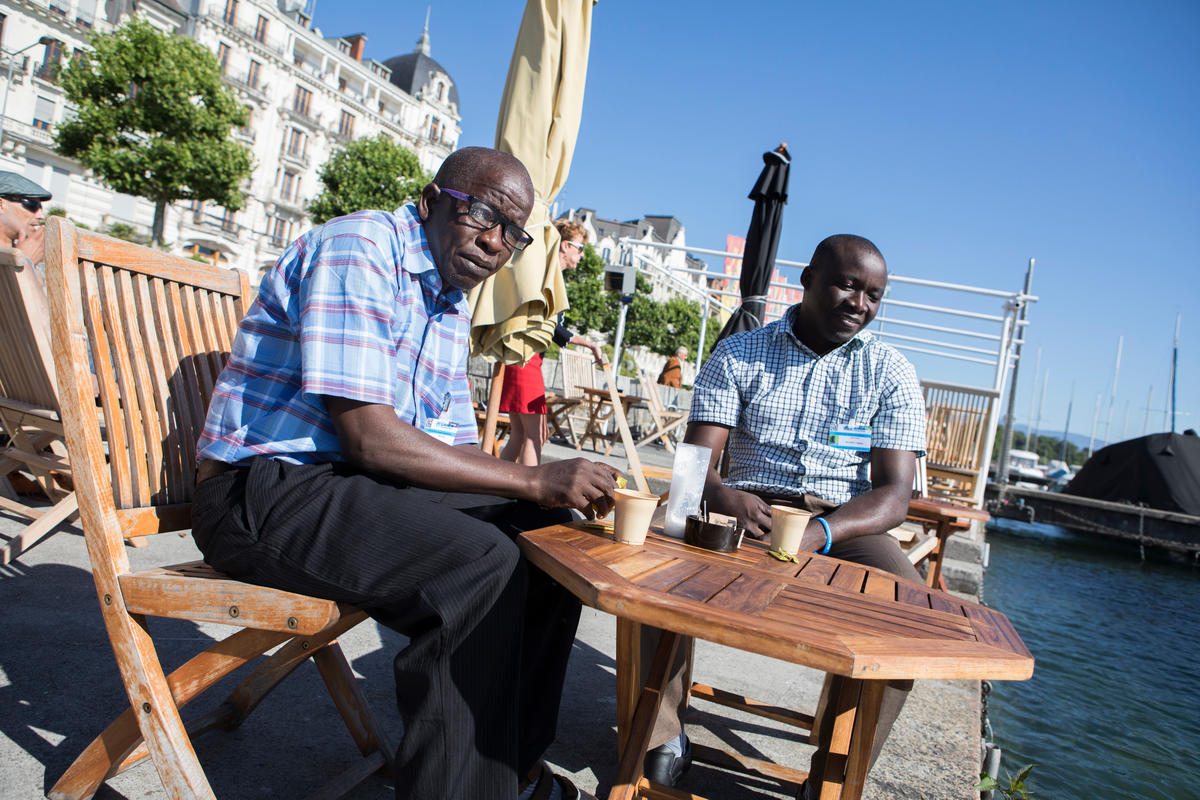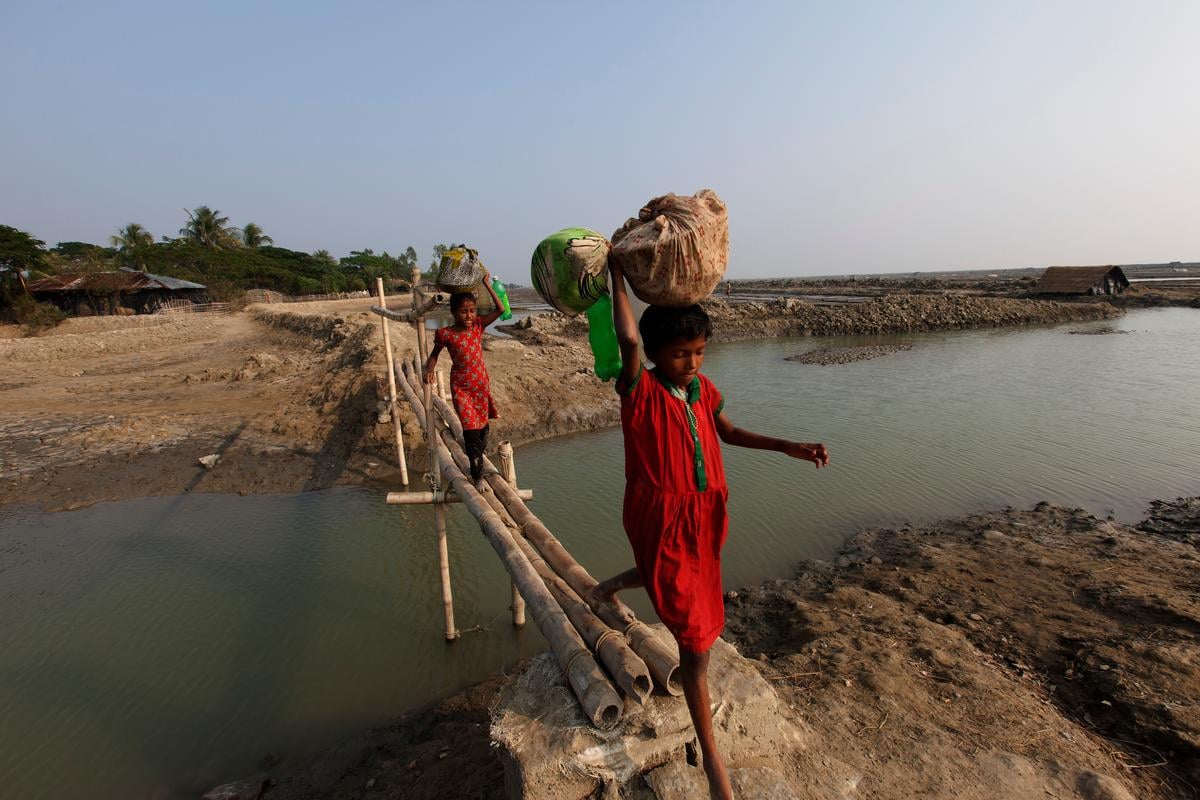Q&A: A clear, firm soprano voice for the world's refugees and displaced
Q&A: A clear, firm soprano voice for the world's refugees and displaced

GENEVA, April 13 (UNHCR) - Internationally acclaimed soprano Barbara Hendricks is UNHCR's longest-serving Goodwill Ambassador, promoting the cause of refugees and displaced people for more than two decades. Passionate about the cause of refugees, Hendricks discussed her work and ideals in a telephone interview from her home in Sweden with Web Editor Leo Dobbs. Excerpts from the interview:
How did you become a UNHCR Goodwill Ambassador?
I was contacted in 1985 by a representative of the UNHCR. I must say I didn't know very much about UNHCR and I think that this lack of recognition by the general public was one of the reasons that the UNHCR felt a need to start a goodwill ambassador programme. The organisation had been, since its inception, solely funded by governments. A lot of governments had started to pull back their funding and I think someone had decided that UNHCR would try to reach out to the public for additional support. One of the things that I felt as a responsibility at the beginning was to try to get people to understand what UNHCR was and what it did.
As I learned about the UNHCR through my visits in the field and my contact with refugees and UNHCR staff, I realised that the work of UNHCR corresponded very much to my own beliefs about the importance of the promotion and defence of human rights and that it would be a way of putting that into concrete action by working with the refugees. Over the years, I really became attached to the cause of refugees because of the implications for defending human rights.
Please tell us a bit about your involvement over the years with UNHCR
It's been a long involvement.... We're talking more than 20 years. It was not always easy due to the nature of the organisation - it's an emergency organisation, which makes it much more difficult to do long-term planning for fund-raising and awareness campaigns. Unfortunately, too many tragic emergencies have come along and put on hold, or ended, some well-laid plans. Very often, when things had calmed, many contacts on the ground were moved to other missions. I've worked under five High Commissioners and they didn't all have the same enthusiasm for the programme, but they all wanted me to stay on and I stayed with it because I had become attached to the cause of refugees.
The programme was not an easy one to continue and there was a time when I really thought that the Goodwill Ambassador programme was me single-handed. I was travelling all over the world and trying to gather the information that would allow me to express the right message. Getting this message out is extremely complicated because every refugee situation is different.
The biggest complexity is the fact that the problems are political and therefore the solutions must be political. Political solutions demand political will and this is the message that we must get out clearly so that it can make a difference for moving public opinion, which in turn moves the political will of governments and of the people in power.
After 15 years I wanted to travel less and to hand over the task to a younger generation so I tried to retire myself but was asked by the UNHCR to stay on as Honorary Goodwill Ambassador for Life. I would have continued to defend the refugee cause in any case, but I will also be available for UNHCR when it needs me for troubleshooting.
You have been on many missions for UNHCR. Which was the most moving?
All are for one reason or another because it's the refugees themselves who have moved and inspired me to keep going, particularly the women with their strength, their dignity and their courage. Unforgettable were the refugees that I met from Rwanda shortly after the genocide. Before that I had been on missions where the conflict and exodus was more distant.
When I met the Rwandan refugees the conflict was still a bleeding wound. It was so close and the suffering was so unbearable. I would say that one of the most unforgettable experiences took place in a feeding centre for children with malnutrition. I was with a mother who was breastfeeding one child and had an older child at her side who was dying of malnutrition and it was obvious there was nothing she could do to save him. But she had to keep her strength so she could keep feeding the baby, who would survive if she kept her health. As a mother it was just heart-wrenching.
You've met a lot of government leaders and other people in positions of power during your travels. What do you tell them?
Exactly what I think.... I tell them what I've learned and what I think about the situation and what we at the UNHCR need for them to do. One of the advantages - and one of the demands I made when I accepted to be a goodwill ambassador - was to have independence. Certainly not to work against the organisation, but to be independent ... and to be able to say exactly what I thought about what I had seen and experienced. That also gave me the possibility of being able to say things that officials or representatives could not say for diplomatic reasons. I insisted on independence and freedom and I was given that and I suppose I used it judiciously.
Have you used music to help refugees?
Not necessarily in the case of singing a concert in a refugee camp. I have sometimes sung, usually for the children, and that's because they have prepared something in class to sing or dance for me. So I thanked them by singing a song. But I don't think they had any idea that it was even my profession. I felt that under those circumstances their needs were much more pressing and that a concert would not be appropriate. The idea was not to go in and sing but to learn about their needs and to try to find some solutions for them.
Where music can help, of course, is in terms of doing concerts that raise money. But I have been dealing more with the political problems. There are popular artists who can make large amounts of money by doing big concerts and occasionally I have done some benefit concerts. But I have been most effective being a spokesperson for the cause of refugees and it is my ability to speak to the press and to affect public opinion that is my greatest asset for the refugee cause.
Conflict in Sudan's Darfur region and Iraq has uprooted hundreds of thousands of people. Do have any thoughts on Darfur and Iraq?
My thoughts are that these tragedies, the suffering, continues and we are not able today to stop it, particularly Darfur - we're watching this unfold before our eyes. We have, since the end of the Second World War, said "never again," yet too many times we have allowed what we are seeing in Darfur to happen. The lack of political will, the lack of seriousness on behalf of the [United Nations] Security Council is just mind boggling.
The situation in Iraq - this is truly an unnecessary disaster. How we get out of it, I really don't know. I think certainly the UN gave its best, unnecessarily, in the lives that were lost. I particularly lost one of my closest friends, Sergio [Vieira de Mello, who spent most of his long career with UNHCR and was killed by a bomb attack on UN headquarters in Iraq in August 2003], and what a waste because they were the best. The ones who agree to go into the situations like that are the best that the UN has to give. We lost the best people, the most courageous. I am sure that others will come to fulfil the need but this was an enormous waste and a painful price that the UN and the world paid, and continues to pay with so many innocent lives lost and destroyed in Iraq in this unnecessary and illegal war.
What has working with UNHCR meant to you?
It has enriched my life incredibly. I don't think I was in danger of losing touch with what is real and essential in life, but it has certainly kept me from ever sliding down some slippery slope of unconsciousness about what's important in life. It's enriched me enormously through the refugees, through the people working in the field in UNHCR as well as with some of their partners.
This work has opened up an even wider world and that's certainly fed my art enormously, because it has put me right at the heartbeat of life and our world. I get very upset and frustrated when I see how much in our rich societies so many people think that the most important goal in life is to be able to consume things that we don't need, that do not fulfil us, are wasteful and are going to pollute the planet anyway. This work has made me less patient with the waste of time and energy and talent on absolutely useless, worthless events, but it has maintained my faith in humanity.
Do you have a message for the world's uprooted people?
In spite of how you may feel, you are not forgotten. There are still courageous and dedicated people working for you, trying to make things better. I wish it could be stronger and faster, but we're still here and you're not alone. Thank you for what you've given to us, thank you for enrichening my life in an unforgettable way.









